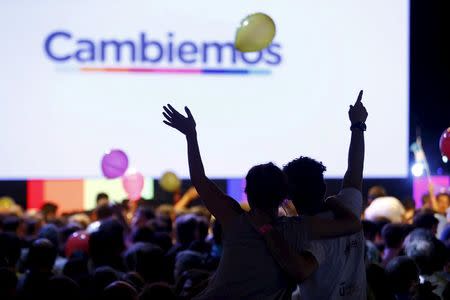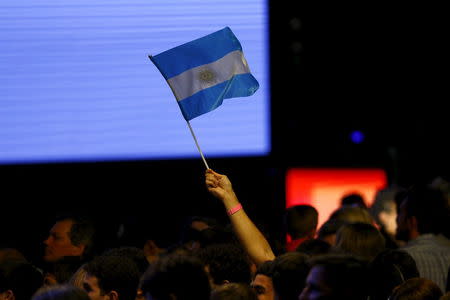Opposition candidate Macri leads Argentina's presidential election
By Jorge Otaola and Juliana Castilla BUENOS AIRES (Reuters) - Conservative opposition candidate Mauricio Macri took a comfortable early lead in Argentina's presidential election on Sunday and three exit polls showed him on course to win after promising business-friendly economic reforms. Loud cheers erupted in Macri's campaign headquarters where his senior campaign officials claimed victory and insiders estimated the center-right mayor of Buenos Aires had won with a solid margin. Argentina's official election body said Macri had 54.5 percent support and Scioli had 45.5 percent with returns in from 12.5 percent of polling stations. "This feels like a dream," said 43-year-old doctor Angela Torres at Macri's headquarters. "A new Argentina is on its way that will be better in every sense." In a sign of Argentines' weariness with a spluttering economy, rising crime and corruption, Macri had gone into the run-off election with a comfortable lead in opinion polls over his ruling party rival Daniel Scioli. A source inside Scioli's campaign bunker told Reuters their own estimates did not look good for their candidate. Scioli's campaign team said they would wait to see official results before making any statements about the election. "If the results stay like this it's a real setback for the country," said Maria Rosa Soria, a 44-year-old hotel worker and Scioli supporter. Macri has promised to set Latin America's third biggest economy on a more free-market course after a combined 12 years of leftist populism under President Cristina Fernandez and her late husband and predecessor Nestor Kirchner. Barred from seeking a third straight term, Fernandez will leave office with Argentina deeply divided between those who back her protectionist policies and defense of worker rights and others who blame her policies for weak economic growth. A moderate within the powerful Peronist movement, Scioli appears to have failed to win over middle-ground voters after struggling to step out of Fernandez's shadow during the election campaign. His talk of maintaining generous social welfare programs and energy subsidies while making only gradual changes to the capital and trade controls that have hobbled the economy hurt his credentials as a candidate for change. "Scioli did not manage to differentiate himself from Fernandez and so people stopped seeing him as a change of style and went over to Macri," said political analyst Mariel Fornoni. Scioli's apparent defeat amounted to an indictment of Fernandez's stewardship of Latin America's No. 3 economy, plagued by double-digit inflation and a widening fiscal deficit, and her confrontational style. She often takes to the airwaves to mock her critics with fiery speeches. She denounces holdout creditors suing the country over defaulted debt as "vultures" and invokes the memory of her late husband as the guiding light of her policies. Still, Fernandez is known as a political fighter committed to her vision of a government actively involved in helping low-income families, and she may return as a presidential candidate in 2019. She appeared on television in recent weeks appealing to voters to ensure that government funding of education, healthcare and programs for poor mothers remains. (Additional reporting by Sarah Marsh and Hugh Bronstein; Writing by Hugh Bronstein and Richard Lough; Editing by Kieran Murray)




